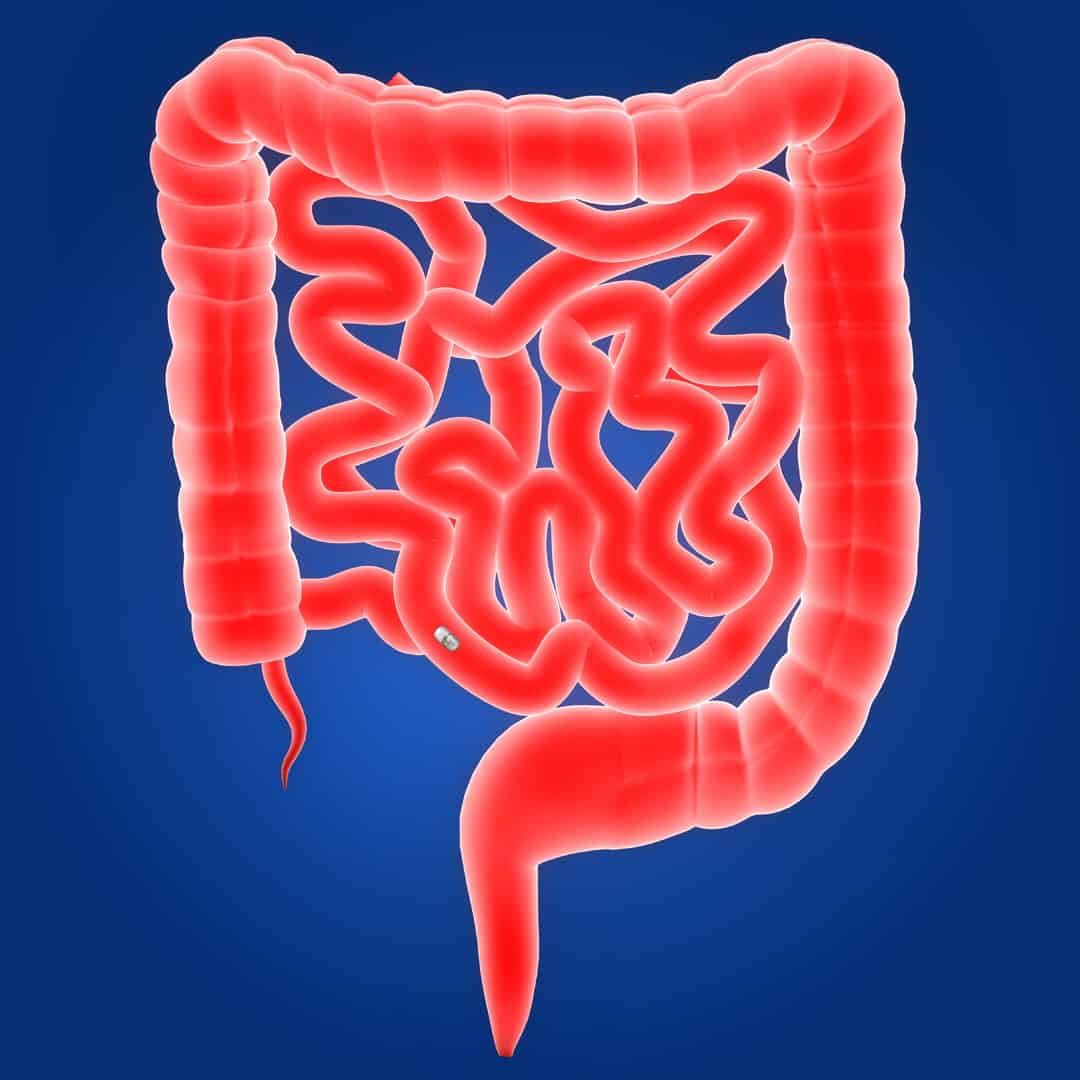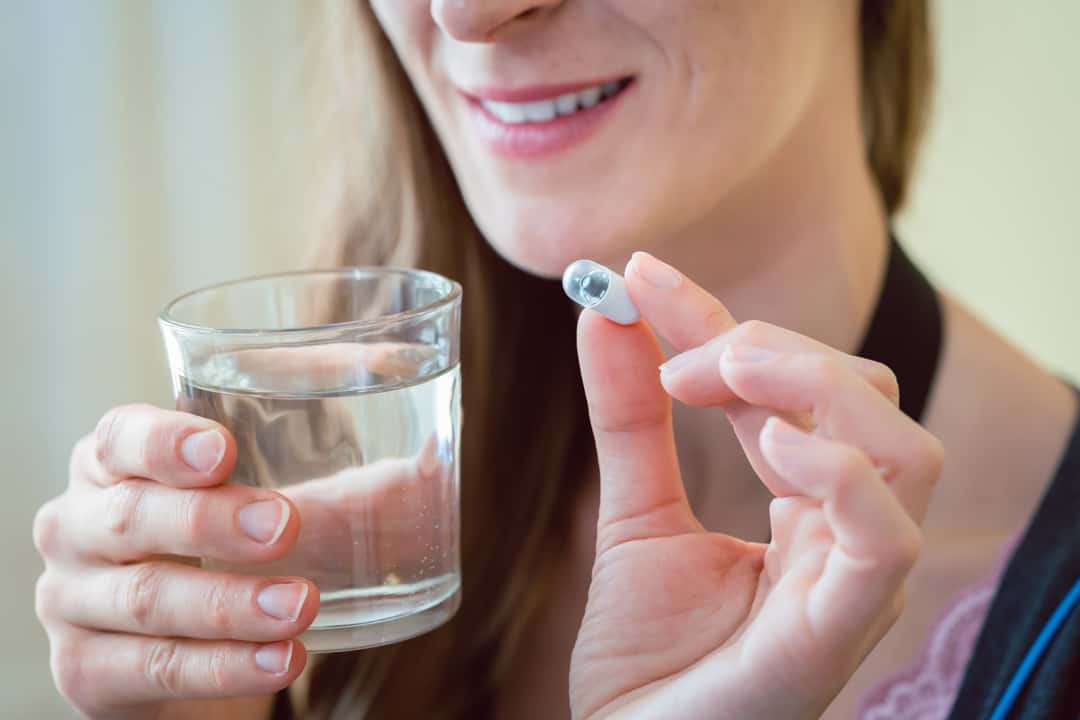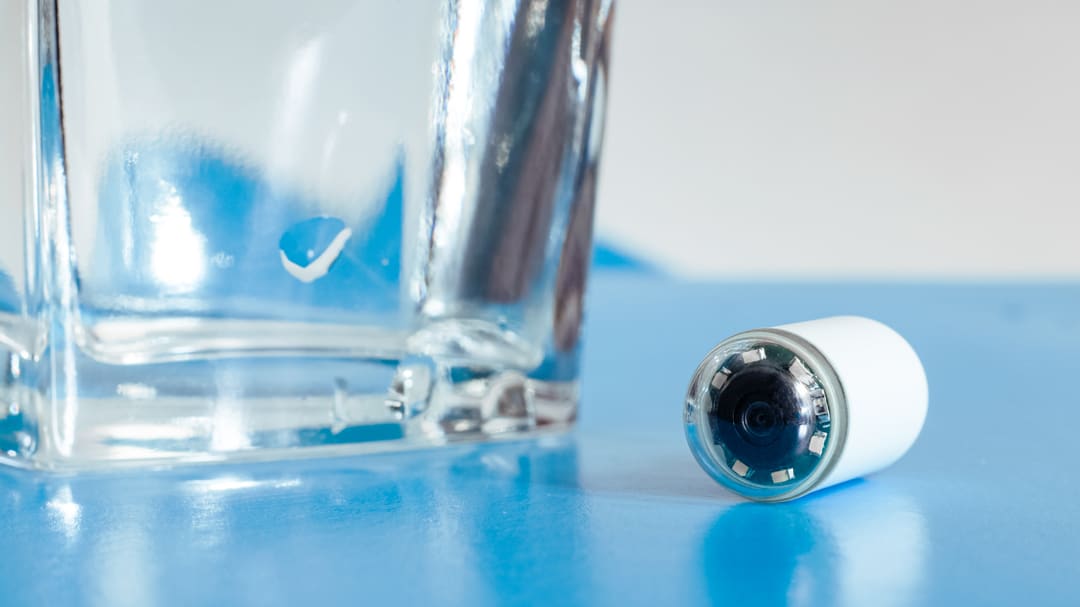What is Capsule Endoscopy?
Capsule endoscopy is a minimally invasive diagnostic procedure used to visualise the inside of your digestive tract, which begins at the mouth and ends at the anus. During a capsule endoscopy, a tiny wireless camera encased inside a small, pill-sized capsule is used to capture images (2 pictures every second for 8 hours) of the digestive tract. The capsule is typically swallowed and then passed out in the stool after a day or two. As it passes through the digestive tract, the camera will take photos that are transmitted to a recorder attached to a belt around your waist.
Capsule endoscopies are usually done to look at areas of the digestive tract that cannot be easily accessed and visualised by traditional endoscopy procedures such as gastroscopy and colonoscopy. Endoscopy is the process in which a small, hollow tube is passed in either through the mouth to visualise the oesophagus and stomach or through the anus to visualise the large intestine. Such areas that are more clearly visualised by capsule endoscopy include the small intestine, which is not typically inspected during traditional endoscopy.
How big is the Capsule Endoscopy device?
The capsule is about the size of a jelly bean or a vitamin pill (11mm x 26mm) and weighs less than 4 grams.
What is Capsule Endoscopy used for?

The capsule endoscopy is commonly used to examine the small intestine, and your doctor may recommend it for the following purposes:
- To screen for a cause of gastrointestinal bleeds, especially for a source of unexplained bleeding in the small intestine.
- To screen for a cause of unexplained abdominal pain that could not be located and identified with the first round of imaging studies.
- To screen for ulcers in the digestive tract, including stomach ulcers and duodenal ulcers, which can be a cause of abdominal discomfort and gastrointestinal bleeding.
- To look for any growths in the digestive tract, including polyps and tumours, that may have malignant potential.
- To diagnose inflammatory bowel diseases, such as Crohn’s disease and coeliac disease, by revealing any areas of inflammation in the small intestine.
- For further investigative purposes, following X-rays and other imaging modalities that depict unclear or inconclusive results.
The small intestine used to be a "no man's land" for Gastroenterologists. But with the advent of the capsule endoscope, your Gastroenterologist can take a closer look at your small intestine and get more detailed information before embarking on more invasive procedures, such as deep enteroscopy or referring you to surgery.
What is the role of Capsule Endoscopies in diagnosing gastrointestinal cancers?
This minimally invasive diagnostic modality is beneficial in detecting gastrointestinal cancers often before any symptoms have even become apparent. This is an important feature as early detection can lead to a good prognosis, especially in the case of bowel cancers like colorectal cancer. In addition to this, capsule endoscopies can be used for surveillance and monitoring purposes when assessing recurrent tumours and treatment outcomes.
How safe is Capsule Endoscopy?
Capsule endoscopies are generally considered safe, however, although rare, they may pose a few risks, such as:
- Capsule retention: While there is not a high risk of this occurring, the capsule can get stuck in the digestive tract. Under these circumstances, your doctor may perform imaging tests like CT scans to locate the capsule or to ensure it is no longer in the body, in case it had passed out in the stools but was missed.
- Bowel obstruction: In some patients, the capsule may get stuck and result in bowel obstruction. If the capsule does not pass out of the body naturally, surgical intervention might be necessary to remove the retained capsule. However, this is rare and seen in only about 1 in every 1000 patients.
Patients should not undergo an MRI scan after a capsule endoscopy procedure until the capsule has passed out.
What can I expect during Capsule Endoscopy in Singapore?

You will be advised to fast (no food or drinks) for at least 8 to 10 hours prior to the capsule endoscopy procedure in Singapore. This is essential to minimise the risk of aspiration and to enhance visualisation of the digestive tract. Fasting will assist the wireless camera in capturing high-quality images.
During the capsule endoscopy procedure, you will first be instructed to wear a sensor belt, which will record and store the images captured by the pill-sized camera as it travels through the digestive tract. Patients will typically be required to wear the sensor belt for about 8-10 hours. Once the recorder is connected and ready, you will be asked to swallow the camera capsule with some water. As there is a slippery coating around the capsule, it is relatively easy to swallow, and you will not feel any discomfort.
After swallowing the pill, patients are usually able to resume their normal day-to-day activities. However, your Gastroenterologist may advise you to refrain from carrying out certain strenuous activities like running and jumping. But this doesn’t mean that you should not be active. The more active you are, the more movement your intestine will have, allowing the capsule to progress easily. They may also recommend that you wait a few hours before eating or drinking to facilitate the passage of the capsule endoscope through the alimentary tract.
Over the next few days, the capsule will pass out through your natural bowel movements. This usually takes about 8-10 hours or up to one to two days after the procedure. Instructions on how to remove, store, and return the sensors will be given to you and due to the small size of the capsule, you might be able to flush it down the toilet.
The images captured into the sensory belt will be examined by your doctor and used to string together a video/ detailed series of the digestive tract. The doctor will then screen for abnormalities in the digestive tract that were captured by the camera.
It may take a few weeks to receive the results of the capsule endoscopy. With thousands of images captured by the capsule camera, your doctor will be able to examine your digestive tract properly and discuss the results with you in due course.
What if I do not see the capsule after two weeks?
If the capsule is not seen after two weeks, there is a likelihood that it is stuck. In the unlikely scenario that the capsule does get stuck, further scans such as an X-ray or CT scan may be needed to locate the capsule or to ensure that it is no longer in the body.
Are there any side effects?
Given the small size of the capsule camera, the odds of experiencing any adverse side effects are rare. Daily life can mostly be resumed once the capsule endoscopy is swallowed, save for the few-hour eating and drinking restrictions after swallowing the capsule.
How to prepare for a Capsule Endoscopy in Singapore?
Apart from fasting, there is not much to prepare, and the procedure is relatively fast and simple. Prior to the procedure, your gastroenterologist may prescribe some laxatives to flush out the contents of the small intestine such as residual food or stool. This is to ensure your gut is clear and empty so that the pill-sized camera can capture quality images for enhanced visualisation.
After you have given consent to perform the procedure, your gastroenterologist will go over the capsule endoscopy procedure with you once more and give you some time to clarify any questions or concerns that you may have.
What is the success rate of Capsule Endoscopy?
According to a study conducted on the diagnostic yields and clinical impacts of capsule endoscopy, colon capsule endoscopy has a relatively high success rate of around 68% to 98%, in patients who underwent an incomplete colonoscopy for a number of procedural-related complications. Furthermore, it was also observed that this procedure was beneficial in reducing perforation (a hole made by piercing) and other colonoscopy-related complications.
Summary

In summary, capsule endoscopies are a novel and minimally invasive technology that helps Gastroenterologists visualise areas that are not typically examined well during traditional endoscopy.
It is a useful adjunct in the diagnosis and management of gastrointestinal diseases. Given its relative ease of use, low complication risk, and propensity to capture detailed images, capsule endoscopy has proven to be helpful in the clinical management of many patients.
References
- Mayo Clinic. Capsule Endoscopy (2023, October 10). Retrieved Oct 26, 2023 from https://www.mayoclinic.org/tests-procedures/capsule-endoscopy/about/pac-20393366
- Johns Hopkins Medicine. Capsule Endoscopy. Retrieved Oct 25, 2023 from https://www.hopkinsmedicine.org/health/treatment-tests-and-therapies/capsule-endoscopy
- WebMD (Editorial contributors). Capsule Endoscopy. Retrieved Oct 26, 2023 from https://www.hopkinsmedicine.org/health/treatment-tests-and-therapies/capsule-endoscopy
- Seung Min Hong, Sung Hoon Jung, Dong Hoon Baek. (2021, October 11). Diagnostic Yields and Clinical Impacts of Capsule Endoscopy. Retrieved October 26, 2023 from
- https://www.ncbi.nlm.nih.gov/pmc/articles/PMC8534535/#:~:text=Colon%20capsule%20endoscopy%20(CCE)%20has,colonoscopy%20complications%20such%20as%20perforation
- Colon Capsule Endoscopy. Cancer Research UK. Retrieved Oct 27, 2023 from https://www.cancerresearchuk.org/about-cancer/bowel-cancer/getting-diagnosed/tests/colon-capsule-endoscopy#:~:text=The%20colon%20capsule%20endoscopy%20can,on%20the%20colon%20capsule%20endoscopy.

